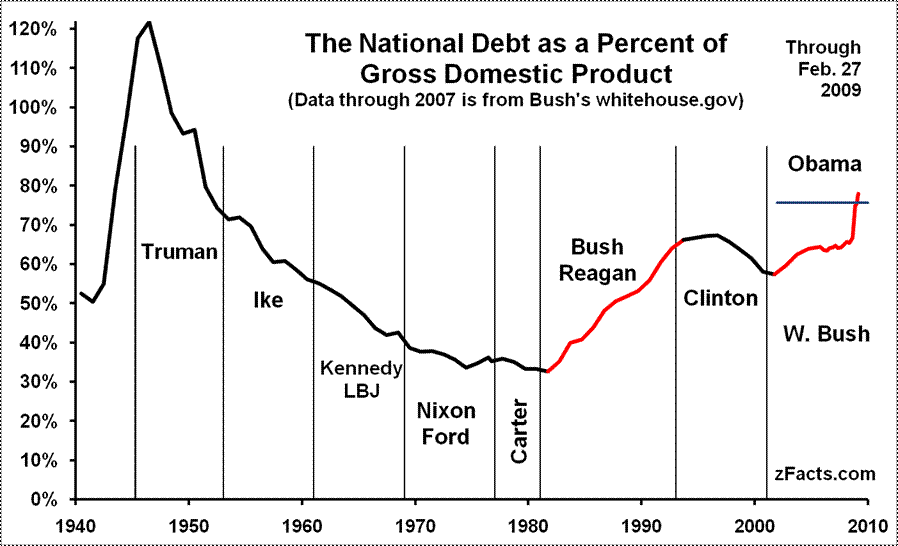In particular, this phrase has to do a lot of heavy lifting:
While not defending the increase of the federal debt under President Bush, it's curious to see Clinton's record promoted as having generated a surplus. It never happened. There was never a surplus and the facts support that position. In fact, far from a $360 billion reduction in the national debt in FY1998-FY2000, there was an increase of $281 billion.Steiner's argument rests on the statistics that show the total national debt continued to increase every year under President Clinton, if you account for the borrowing from the Social Security trust fund. True, that.
But applying Steiner's accounting methods across the board hardly serves as a condemnation of William J. Clinton's stewardship of the economy. Instead it highlights the fiscal recklessness of Ronald W. Reagan and George W. Bush - something Steiner takes pains to avoid discussing.
It's quite true that, starting with LBJ, the government operated under what's called a "unified budget," masking the size of the budget deficit because of borrowing from the SS trust fund (though it's more complicated than that if you follow the link). But it's also true that SS is treated as "off-budget" (which Steiner calls "twisted Washington accounting games") because its income and outlays are fixed by statute, and not subject to the annual budgetary process. Steiner himself concedes that "Social Security is legally required to use all its surpluses to buy U.S. Government securities," a process not unique to or controlled by Clinton. But he leaps from there to claiming that the trust fund therefore doesn't exist because "the money has already been spent--in part, effectively, to pay down the public debt under Clinton."
This is a bit rich coming from the same guy who doesn't wish to discuss the increase in debt under Bush the Lesser - or even mention Ronald Reagan's record. If you insist on using "total increase in debt" as the metric, then, as the chart above shows, Clinton comes out smelling like a rose compared to the competition (and Bush's the Elder's performance was made possible by the fact that Democrats in Congress forced him to accept tax hikes to help dig out from Reagan's debt burden).
What's true is that Clinton's first budget, passed over unanimous Republican opposition, made it possible to further dig out from the deep hole Reagan left us in, and allowed the Fed to loosen monetary policy enough to fuel the longest post-war stretch of GDP growth. Under Clinton's last budgets, the government was taking in more than it spent - if you don't count the trust fund borrowing. But if you do count it, Clinton still looks like the most prudent budgeter we've had. As Steiner's own stats show, the FY2000 budget resulted in a total increase in public debt of only $18 billion - a rounding error compared the mess Bush II left us in.
Clinton left office under a recession, mild compared to the previous Bush's, and insignificant compared to the subsequent Bush's. As a result the FY 2001 budget showed higher outlays and lower receipts. But conservatives can't have it both ways. If it's correct to attribute FY2001 to Clinton's policies - and it is - then it's also correct to put the disastrous FY2009 in W's column. You certainly wouldn't know that from all the right-wing websites claiming Obama has doubled (or tripled) the debt,
Finally, Steiner dismisses any critics who argue that debt as a share of GDP is a better measure of fiscal performance. But as he concedes, it's a measure of the total debt burden, not the total amount - which is precisely the point. Given GDP and employment growth under Clinton, the modest increases in total debt were less burdensome, just as the anemic growth under Bush II made his debt increases more painful by far. The accompanying chart shows why conservatives would rather we avoid looking at this particular metric.
Bottom line is that Steiner is correct to say that total indebtedness increased (modestly) under Clinton. He can take the former president and his defenders to task for rhetorical excess in claiming he reduced the debt (though he did reduce the deficit, considerably), But conservatives can't use that argument to make the case that Clinton's economic performance was any kind of a disaster. The disaster came later, when George W. Bush threw Clinton's budgeting out the window and started handing out tax cuts on the grounds that the government was "overcharging" us. Compare that to what Clinton said we should do with the alleged surpluses he was generating: "Save Social Security."


No comments:
Post a Comment